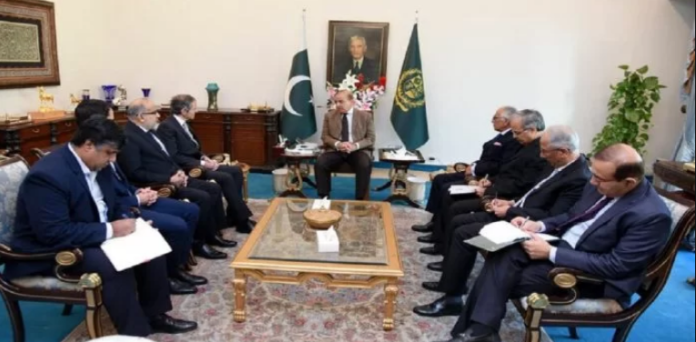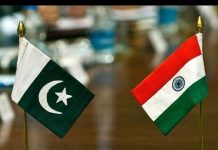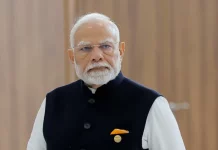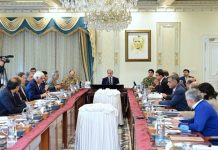-Rafael Mariano Grossi meets PM, FM in Islamabad during day first of his official visit to Pakistan
-PM stresses collaboration with UN Nuclear Agency to reduce Climate change losses
-FM, IAEA Chief discuss use of Nuclear technology for public use
Staff Report
ISLAMABAD: Director General of the International Atomic Energy Agency (IAEA), Rafael Mariano Grossi Wednesday visited various nuclear facilities including Pakistan Atomic Energy Commission (PAEC) to discuss matters related to mu-tual cooperation.
The DG IAEA arrived in Pakistan on a two-day official visit to discuss matters related to Pakistan-IAEA collaboration. This is his maiden visit to Pakistan after assuming office in 2019.
During his stay in Pakistan, Director General Grossi visited various nuclear facilities including that of the Pakistan Atomic Energy Commission (PAEC) whereas Dr. Raja Ali Raza Anwar, Chairman PAEC accompanied the state guest.
At the outset of his visit, Grossi inaugurated the latest Cyber Knife facility at PAEC’s flagship cancer-care hospital in the capital named Nuclear Medicine, Oncology and Radiotherapy Institute (NORI). With the inauguration of this facility, NORI became the first public sector cancer hospital of the country to provide cyber knife treatment.
During his visit at NORI hospital, he visited various departments and facilities and appreciated the services of the 19 PAEC cancer hospitals, especially NORI, in the diagnosis and treatment of cancer in line with the IAEA’s ‘Rays of Hope’ initiative.
It is to mention here that ‘Rays of Hope’ focuses on prioritizing a limited number of high-impact, cost-effective and sustainable interventions in line with national needs and commitment.
The initiative aims at contributing to the fulfilment of the UN 2030 Agenda and the Sustainable Development Goal-3 (SDG-3) i.e. Good Health and Well-Being.
The DG IAEA highlighted the IAEA’s assistance in strengthening cancer hospitals in developing countries to provide treatment to patients at par with international standards.
The guest was also briefed about the role of PAEC’s 19 cancer hospitals established in all provinces of Pakistan that are shouldering the responsibility of diagnosing and treating over 80% of the country’s cancer-affected patients in line with the IAEA’s slogan – ‘Cancer Care for All’.
Later, DG IAEA visited the Pakistan Institute of Nuclear Science and Technology (PINSTECH) to see various laboratories including the isotope hydrology lab and isotope production facility that is supplying radiopharmaceutical kits for cancer patients throughout the country.
He also met with female fellows enrolled in the IAEA’s Marie Sklodowska-Curie Fellowship Programme (MSCFP) which aims to help increase the number of women in the nuclear field.
Launched by IAEA in 2020, MSCFP provides financial support to 100 plus female students from around the world to-wards tuition and living costs, and an opportunity to undertake internships facilitated by IAEA to gain practical experi-ence in various fields of nuclear science, medicine, engineering, safety, security and safeguards.
The DG IAEA also visited the Pakistan Centre of Excellence for Nuclear Security (PCENS) and lauded the Centre’s out-standing efforts by offering cutting- edge education and training in the field of nuclear security.
Day one of DG IAEA’s official visit concluded with a detailed tour of Chashma Nuclear Power Generating Station (CNPGS) located in Chashma District, Mianwali, which houses four nuclear power plants that are generating and sup-plying to the national grid 1330 MW of clean, cost-effective and reliable electricity.
The DG also visited the Master Control Room (MCR) of Chashma Nuclear Power Plant Unit-3, a simulator established at Chasnupp Centre for Nuclear Training (CHASCENT) where nuclear power operators receive training to run the nuclear power plant safely in accordance with international standards.
Meanwhile, Prime Minister Shehbaz Sharif on Wednesday stressed greater collaboration with International Atomic Energy Agency (IAEA) in terms of research on new high-yield and drought resistant varieties of crops.
In a meeting with Director General IAEA Rafael Mariano Grossi, the prime minister emphasized collaboration in view of the impact of climate change on Pakistan and related challenges including water, energy and food security.
Shehbaz Sharif noted the contribution of nuclear power generation to Pakistan’s energy mix as a cleaner and more affordable source of energy.
The prime minister appreciated the ongoing cooperation between the IAEA and Pakistan in the areas of health, agri-culture, industry, nuclear medicine and power generation.
He expressed Pakistan’s full support for various projects and programmes of the Agency and conveyed Pakistan’s keenness to expand its footprints in the Agency’s work both as a recipient and provider of expertise and technical as-sistance.
Director General Grossi was briefed about the crucial role being played by the 19 cancer hospitals being operated by the Pakistan Atomic Energy Commission (PAEC) which were bearing the bulk of cancer burden in Pakistan and offering services to the general public at nominal rates.
The IAEA Director General agreed to the need for expanding applications of nuclear technology in countries like Paki-stan to address a whole suite of climate-related challenges.
He expressed his appreciation for the good work of the agricultural research institutions in Pakistan, including NIAB which is one of the IAEA Collaborating Centers in Pakistan.
Acknowledging Pakistan’s expertise in nuclear applications in various fields the Director General noted the important role Pakistan can play for supporting the Agency’s work including its ‘Ray of Hope’ initiative for cancer treatment.
The IAEA Director General is on a two-day visit to Pakistan. During his stay in Pakistan he will be visiting various nuclear facilities, cancer treatment centers and agricultural research institutions employing nuclear technology for sustainable development.
He will also witness the excellent standards of nuclear safety and security being maintained by Pakistan.
Besides, Foreign Minister Bilawal Bhutto Zardari and Director General of International Atomic Energy Agency (IAEA) Rafael Mariano Grossi met here Wednesday and discussed matters relating to nuclear technology.
The foreign minister emphasized using atomic energy in areas of public interest including health, electricity generation, agriculture, and industries.
The IAEA director general lauded the nuclear capability of Pakistan, the Foreign Office said.
Rafael Mariano Grossi is on a visit to Pakistan from February 15 and 16.
During his two-day visit, the DG IAEA will hold high-level meetings and undertake visits to different institutions em-ploying nuclear technology in the fields of health, agriculture, industries, and power generation.
The Foreign Office said, “The visit will provide an opportunity for Pakistan and the IAEA to explore avenues for further strengthening their ongoing cooperation in the area of peaceful applications of nuclear technology for the socio-economic development of the country.”
Pakistan is a founding Member of the Agency since 1957 and enjoys longstanding and mutually beneficial collaboration with the IAEA.




